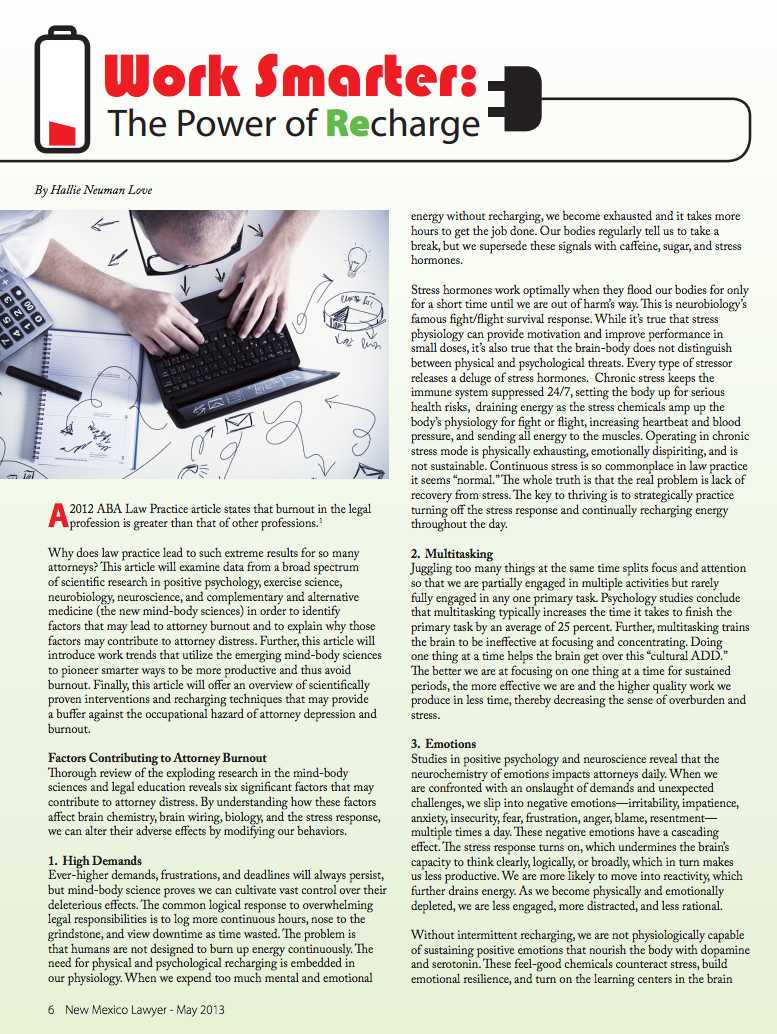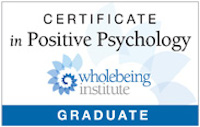This article, second in an occasional positive psychology series, examines the benefits of developing and using strengths of character in the practice of law.
Psychologists associate the regular application of character strengths or positive traits— such as optimism, zest, gratitude and curiosity—with the promotion of positive emo- tions, which, in turn, create overall well-being.
What is the science of character?
Using one’s character strengths in the practice of law pro- motes a productive path for attorneys to increase their life satisfaction and success while working in a profession replete with depression, anxiety, addic- tion, dissatisfaction and ill health.
In the early 2000s, psychologists Martin Seligman and Christo- pher Peterson led a three-year project involving 55 distinguished scientists devoted to examining character traits across cultures and time. Out of this project, Seligman and Peterson identified six universal virtues —wisdom, courage, humanity, justice, tem- perance and transcendence— in which 24 character strengths reside. Their assemblage of virtues and character traits forms a scientific knowledge base and classification system of what is best about human beings and what builds fulfillment and happiness. One of the key findings about character evident from this project and hundreds of subsequent research studies is that each individual possesses all 24 character strengths in different degrees and combinations relative to context, resulting in a unique profile.
To determine your predominant character strengths, Seligman and Peterson developed VIA-IS, a free, 240-question survey found online at the Values in Action website: www.viacharacter.org. The survey helps people understand the differences between who they are (their character) versus what they can do (their talents) and what they like (their interests.)
Generally, our top character strengths occur easily without much effort and resonate as being so natural one could not help but use them. These strengths are energizing as we embody them, and we would feel a deflation of spirit and emptiness if we could not express them. When people use their top strengths, they report feeling more energized and self-actualized, which allow them to fulfill their potential to a greater degree. We also have situational strengths that we can call on when needed. Additionally, other strengths can be developed to benefit our clients, the legal profession and ourselves.
What are some ways character strengths can be used in the practice of law?
Making regular use of one’s character strengths is a good mental health practice as well as an effective business strategy for attorneys. Employing character strengths provides motivation to stay in a challenging profession and helps prevent burnout. The resultant greater job satisfaction averts unwanted consequences such as employee turnover or malpractice, often caused by alcoholism and depression.
Developing a balanced use of intellectual, self-oriented “head” character strengths and emotional and interpersonal “heart” character strengths can also be a valuable law practice tool. For example, an attorney who is strongest in “head-focused” character strengths—prudence, bravery, persistence and self-control— that are most useful for analytical aspects of lawyering, can benefit from training that enhances “heart-focused” strengths—kindness, grati- tude and social intelligence that are well-suited to the relationship aspects of law such as management, mentoring and rainmaking.1
Attorneys can learn to modulate their strengths to reach desired results. “Head” strengths may temper “heart” strengths such as applying prudence to lessen a tendency to micromanage or be overzealous, and in the area of collections, the “heart” strength of kindness may temper the “head” strength of persistence.
Finally, it is highly desirable to be able to shift between analytical head strengths and relational heart strengths to change communi- cation styles. While the pessimistic or prudent way of thinking is inherent and required in the practice of law, it may be destructive in one’s personal life where an optimistic thinking style and prac- tice of the heart strengths (kindness, gratitude, social intelligence and love) lead to positive relationships that also build emotional resilience. In other words, legal cross-examination can stay at work and use of heart strengths can help one hone a conciliatory communication style for use at home.
What is the correlation between strengths’ use and attorney life satisfaction, well-being and success?
Many of us are doing OK or “pretty good.” Still, life may feel flat and depression rates are rising. We know from positive psychology that a meaningful life provides greater overall life satisfaction and well-being. Many of us spend more of our lives at work than with family or friends so the question becomes, “What can we do to give our time at work more meaning?”
Daily use of our top character strengths enables us to live a meaningful life where we enjoy what we are doing and feel pride and satisfaction in our work; it also energizes us, increases our pro- ductivity and helps us make the demands of the work worthwhile
Some lawyers find more meaning and can bring their strengths to fruition by making a difference, helping clients, being a trusted advisor, bringing in business, finding satisfying intellectual stimu- lation, or creating good office relations and collaboration. Landing a job in a niche in the law that capitalizes on your top strengths provides meaning and a better way to perceive your work as a calling rather than a job.
Additionally, as we are always in control of our perceptions, we can change the way we think about our job or our relationships with our co-workers. We can restructure how we approach work by reshaping certain attitudes in order to find more ways to embellish and access our strengths. If you have little latitude to make decisions, perhaps you can recraft your job tasks for more perceived control or practice character strengths in your relation- ships at work, over which you have high control.
Finally, knowledge of one’s individual character strengths may prompt certain lawyers to seek a more strengths-compatible practice or work environment.
Conclusion
Character can be learned and practiced. Research has established that regularly using one’s character strengths provides meaning in life, predicts fulfillment and success, and increases positive emotions, well-being and resilience.2
In the traditionally analytically based legal profession, heart strengths need not be sacrificed to head strengths. It is possible and advantageous to use both heart and head strengths and to identify practice areas that profit from each to build our best law practice and life.
1 Snyder, P. Super Women Lawyers: A Study of Character Strengths. University of Pennsylvania Scholarly Commons, 2012.
2 Seligman, M.E.P., Authentic Happiness: Using the New Posi- tive Psychology to Realize Your Potential for Lasting Fulfillment, New York, NY, 2004.
Download a PDF of this article (PDF)
Learn and Practice: Exercises for Developing Character Strengths
You can strengthen your character strengths by focusing on thoughts, emotions and behaviors. One exercise is to focus on a top character strength in a new way each day for a week. Another proven exercise to develop optimism is to regularly recall and savor three things that went well each day. Not only will this lift your mood, but it will also identify the good things that are working well for you and, over time, create benefit-finding neural pathways in your brain.

 A Huichol boy has been selected by the creator of all growing things to escape the coming flood.
A Huichol boy has been selected by the creator of all growing things to escape the coming flood.








